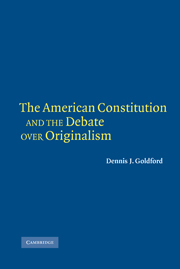Book contents
- Frontmatter
- Contents
- Preface
- Introduction
- 1 The Politics of Originalism
- 2 The Concept of a Living Constitution
- 3 Interpretivism and Originalism
- 4 The Paradox of Originalism
- 5 The Problem of Objectivity
- 6 The Epistemology of Constitutional Discourse (I)
- 7 The Epistemology of Constitutional Discourse (II)
- 8 The Ontology of Constitutional Discourse (I)
- 9 The Ontology of Constitutional Discourse (II)
- 10 Conclusion: The Political Character of Constitutional Discourse
- Index
7 - The Epistemology of Constitutional Discourse (II)
Published online by Cambridge University Press: 14 May 2010
- Frontmatter
- Contents
- Preface
- Introduction
- 1 The Politics of Originalism
- 2 The Concept of a Living Constitution
- 3 Interpretivism and Originalism
- 4 The Paradox of Originalism
- 5 The Problem of Objectivity
- 6 The Epistemology of Constitutional Discourse (I)
- 7 The Epistemology of Constitutional Discourse (II)
- 8 The Ontology of Constitutional Discourse (I)
- 9 The Ontology of Constitutional Discourse (II)
- 10 Conclusion: The Political Character of Constitutional Discourse
- Index
Summary
In two imposing works entitled Constitutional Interpretation and Constitutional Construction, Keith Whittington has offered one of the most sophisticated accounts of constitutional interpretation in the recent literature of constitutional theory. The former volume, in particular, addresses the question of whether that form of constitutionalism centered on a written text dictates the originalist approach to interpretation as a, if not the, necessary condition of its possibility. Originalism, of course, is the theory that we should understand constitutional provisions in the terms in which they were understood by those who wrote and ratified those provisions. In Whittington's words:
The critical originalist directive is that the Constitution should be interpreted according to the understandings made public at the time of the drafting and ratification. The primary source of those understandings is the text of the Constitution itself, including both its wording and structure. The text is supplemented by a variety of secondary sources of information, however. Historical sources are to be used to elucidate the understanding of the terms involved and to indicate the principles that were supposed to be embodied in them. The guiding principle is that the judge should be seeking to make plain the “meaning understood at the time of the law's enactment.”
Does constitutionalism indeed require originalism? Whittington's answer, simply and resoundingly, is: yes.
The virtue of Whittington's approach to this question is that he recognizes that we cannot ground adherence to the intentions of the Framers on the claim that the Framers intended that we do so.
- Type
- Chapter
- Information
- The American Constitution and the Debate over Originalism , pp. 208 - 234Publisher: Cambridge University PressPrint publication year: 2005



